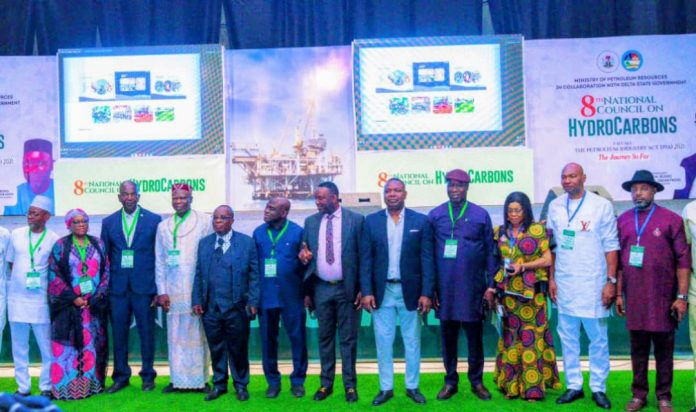Asaba, Delta State – On Tuesday, December 10, 2024, the Dome Event Center in Asaba became a hub of activity as Delta State hosted the 8th Meeting of the National Council on Hydrocarbons (NCH). This landmark conference brought together key stakeholders in the oil and gas sector to assess and advance the implementation of the Petroleum Industry Act (PIA) 2021, under the theme, “The Petroleum Industry Act (PIA) 2021 – The Journey So Far.”
In his welcome address, Hon. (Chief) Peter Okagbare Uviejitobor, Delta State Commissioner for Oil and Gas, reaffirmed the state’s dedication to utilizing hydrocarbons as a tool for socio-economic development and sustainable growth. He lauded Governor Rt. Hon. Sheriff Oborevwori for his leadership in facilitating Delta State’s hosting of the event.

Uviejitobor emphasized the importance of collaboration among the government, industry players, and host communities to drive transparency, efficiency, and local content development within the oil and gas industry.
Uviejitobor called for greater involvement of host communities, urging delegates to focus on mitigating the impact of oil and gas activities on these communities.
Amb. Nicholas Agbo Ella, Permanent Secretary of the Ministry of Petroleum Resources, represented by Engr. Busari Kumoru, Director of the Upstream Department, highlighted the significance of the NCH as a policy development platform. He stressed the need for innovative solutions to the challenges facing Nigeria’s oil and gas sector.
Ella underscored the Federal Government’s focus on cleaner energy sources, particularly natural gas, to stimulate economic growth. Key initiatives such as the Gas Transportation Network Code and the National Gas Expansion Programme were spotlighted, aimed at unlocking the potential of Nigeria’s 200.79 trillion cubic feet of gas reserves.
Over the five-day event, participants are set to Deliberate on policy reforms and the progress of the PIA’s implementation and address key challenges, including the allocation of the 3% Host Community Fund and gas commercialization.
Mr. Usman Abdulkadu, Director of Planning and Statistics at the Ministry of Petroleum Resources, stressed the importance of the retreat as a forum for knowledge-sharing and problem-solving. “The PIA marks a bold step in Nigeria’s administration and utilization of its crude deposits. This conference is our opportunity to assess its progress and propose solutions for its effective implementation,” Abdulkadu remarked.
Mikel Ebuh, National Chairman of the Host Communities, raised critical concerns regarding the implementation of the 3% Host Community Fund. He pointed out discrepancies in the registration of host communities, which has left many affected by gas flaring excluded from the fund.
“We have over 154 communities affected by gas flaring, yet less than 80 have been registered to benefit from the 3% Host Community Fund,” Ebuh stated. “From 2021 to date, over N1 trillion should have been allocated. Where is the money, and who are the beneficiaries?”
Ebuh’s remarks underscored the need for transparency and accountability in fund allocation and utilization.
Chief Fidelis Tilije, Delta State Commissioner for Finance, highlighted the economic burden of petroleum product imports. He revealed that in just 90 days, Nigeria spent over N3 trillion importing Premium Motor Spirit (PMS).
Tilije urged stakeholders to collaborate on strategies to reduce import dependence, optimize resource management, and harness Nigeria’s vast oil reserves for economic growth.
“Oil remains the backbone of Nigeria’s economy. Even non-oil taxes are generated from oil activities. We need to cooperate with oil companies to maximize benefits and eliminate waste,” Tilije emphasized.
Three years into its implementation, the Petroleum Industry Act 2021 has reshaped Nigeria’s oil and gas landscape. It has enhanced transparency, improved regulatory efficiency, and empowered host communities.
The ongoing deliberations at the NCH aim to tackle challenges hindering the Act’s full potential, ensuring its benefits are equitably distributed among all stakeholders.
As delegates engage in robust discussions, Delta State’s warm hospitality and strategic importance in Nigeria’s oil and gas sector remain evident. The event, which runs until Friday, December 13, 2024, is expected to yield actionable recommendations that will shape the future of Nigeria’s petroleum industry.
Delta State’s hosting of the NCH underscores its pivotal role in driving national conversations on hydrocarbons, economic growth, and sustainable development.




